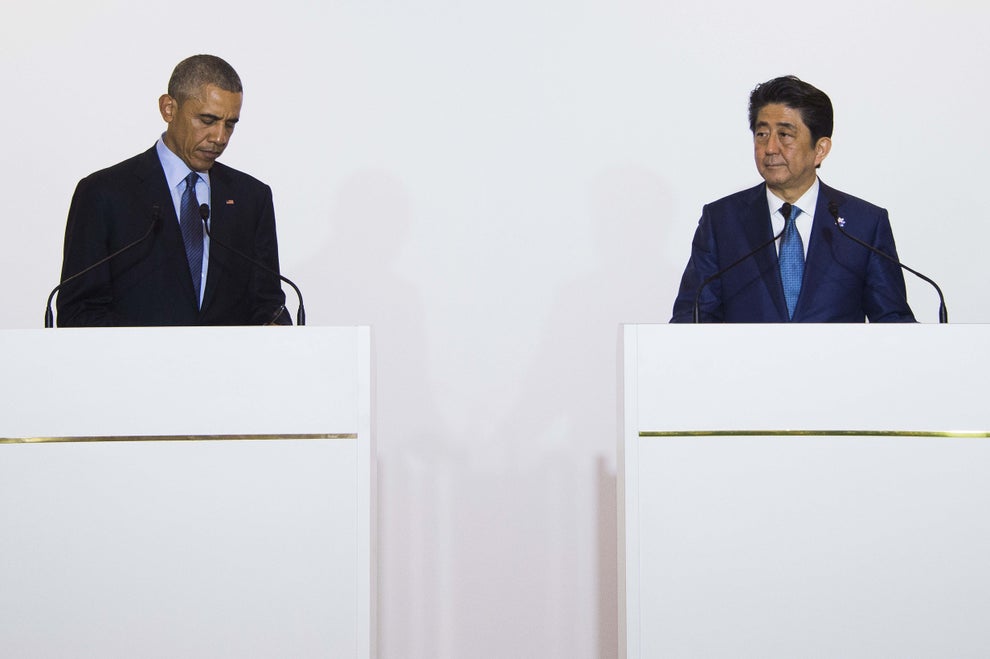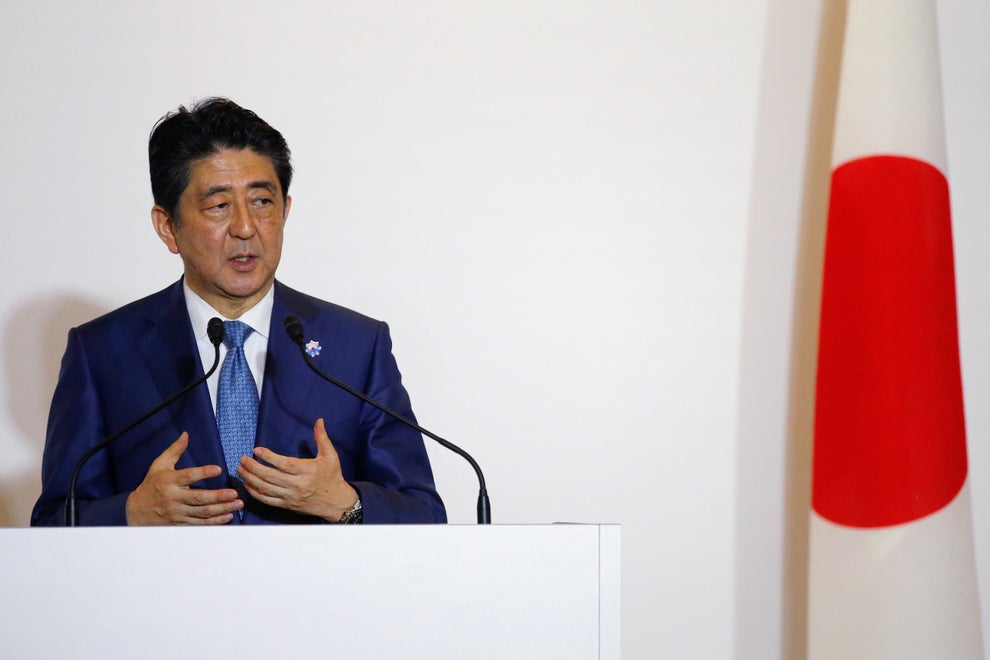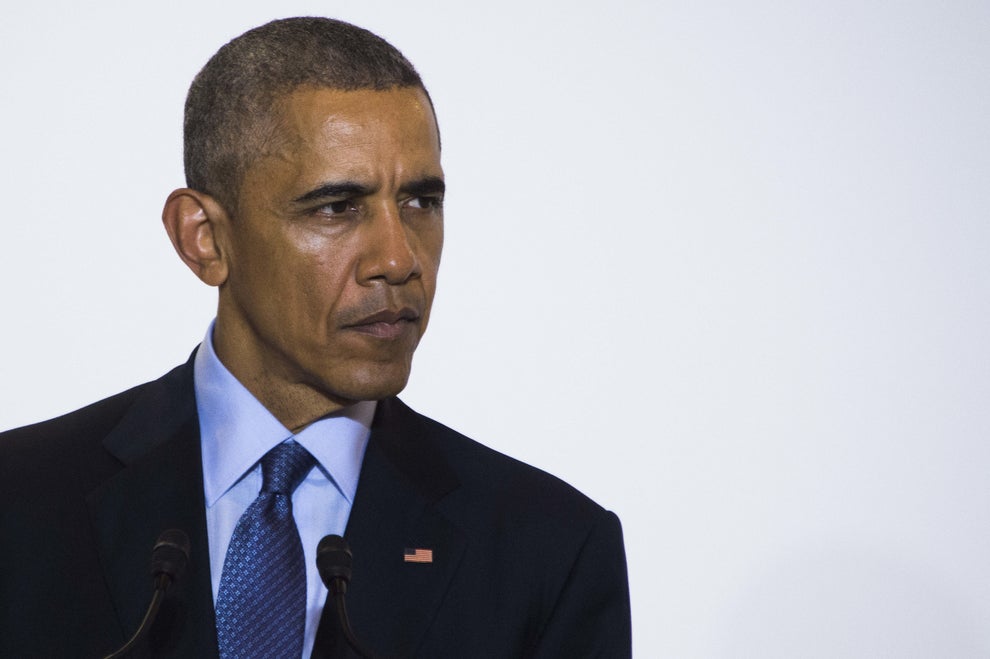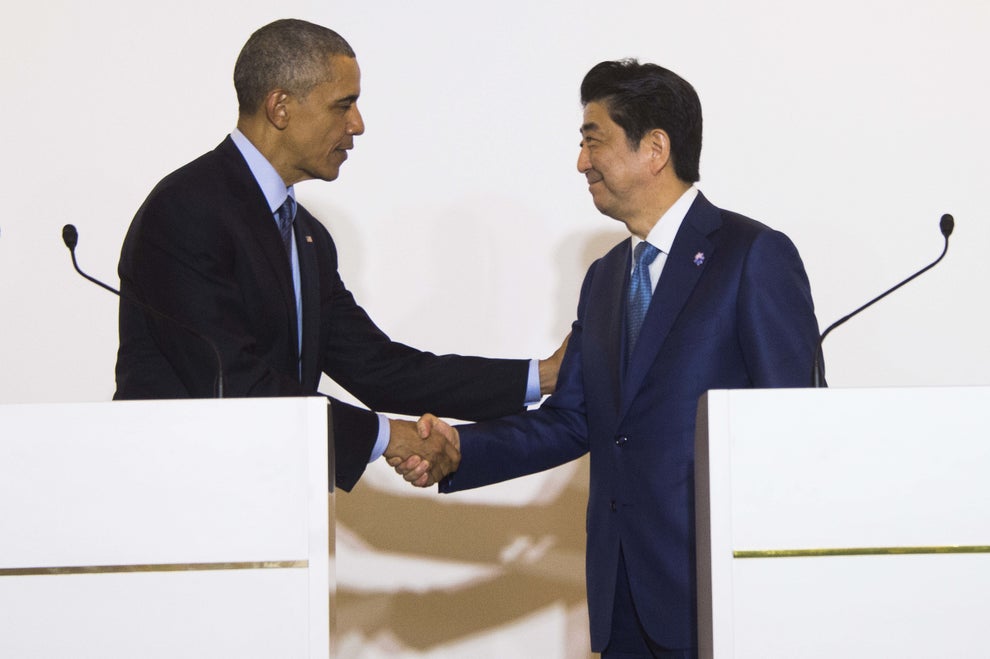なぜ慰霊碑の向こうに原爆ドームが見えるのか? 世界的巨匠が託した思い
オバマが見る光景を作った男・建築家丹下健三
https://www.buzzfeed.com/satoruishido/kenzo-tange-hiroshima?utm_term=.gkmdB4b9Z#.vnLo46Zxq
オバマ大統領の広島演説で英語の勉強(英文・和訳対比)
平成28年5月27日(金)、オバマ大統領がアメリカの大統領としてはじめて被爆地広島を訪問しました。この歴史的な日におこなわれた素晴らしいスピーチを、英語の勉強に活かしたいと思い、記録として残しておくことにしました。
当日の様子は、以下の動画で見られます。スピーチは3分40秒あたりからはじまります。
オバマ大統領 広島スピーチ全文
Seventy-one years ago, on a bright cloudless morning, death fell from the sky and the world was changed. A flash of light and a wall of fire destroyed a city and demonstrated that mankind possessed the means to destroy itself.
71年前のよく晴れた雲のない朝、空から死が降ってきて世界は変わった。閃光(せんこう)と火の壁が町を破壊し、人類が自らを滅ぼす手段を手にしたことを示した。
Why do we come to this place, to Hiroshima? We come to ponder a terrible force unleashed in the not so distant past. We come to mourn the dead, including over 100,000 Japanese men, women and children, thousands of Koreans and a dozen Americans held prisoner.
我々はなぜここ広島を訪れるのか。それほど遠くない過去に解き放たれた、恐ろしい力について思いを致すためだ。亡くなった10万人を超える日本の男性、女性、子供たち、数千人の朝鮮半島出身の人々、そして捕虜になった十数人の米国人を追悼するためだ。
Their souls speak to us. They ask us to look inward, to take stock of who we are and what we might become.
彼らの魂は我々に内面を見つめ、我々が何者であるか、これからどのようになっていくのかを考えるように語りかけている。
It is not the fact of war that sets Hiroshima apart. Artifacts tell us that violent conflict appeared with the very first man. Our early ancestors, having learned to make blades from flint and spears from wood, used these tools not just for hunting but against their own kind.
広島を際立たせているのは戦争という事実ではない。歴史的な遺物をみれば、暴力による争いが初期の人類からあったことが分かる。我々の初期の祖先は石から刃物を作り、木からヤリを作る方法を学んだ。こうした道具を狩りだけでなく、同じ人類に対しても用いるようになった。
On every continent the history of civilization is filled with war, whether driven by scarcity of grain or hunger for gold, compelled by nationalist fervor or religious zeal. Empires have risen and fallen, peoples have been subjugated and liberated, and at each juncture innocents have suffered -- a countless toll, their names forgotten by time.
世界の文明の歴史は穀物不足や黄金への欲望、民族主義や宗教的熱意といった理由で、戦争で満ちている。帝国は台頭し、衰退した。人々は支配されたり解放されたりしてきた。節目節目で苦しんできたのは罪の無い人々であり、数え切れない彼らの名前は時とともに忘れ去られてきた。
The World War that reached its brutal end in Hiroshima and Nagasaki was fought among the wealthiest and most powerful of nations. Their civilizations had given the world great cities and magnificent art. Their thinkers had advanced ideas of justice and harmony and truth, and yet the war grew out of the same base instinct for domination or conquest that had caused conflicts among the simplest tribes, an old pattern amplified by new capabilities and without new constraints.
広島と長崎で残虐な終わりを迎えた世界大戦は、最も豊かで強大な国の間で起きた。彼らの文明は世界に偉大な都市、素晴らしい芸術をもたらしてきた。思想家は正義と調和、真実という概念を発展させてきた。しかし戦争は初期の部族間であった支配や征服と同じような本能から生まれてきた。新たな能力が、支配欲や征服欲が争いを呼ぶという古くからの構造を増幅させた。
In the span of a few years some 60 million people would die: men, women, children -- no different than us, shot, beaten, marched, bombed, jailed, starved, gassed to death.
数年の間におよそ6千万人の命が奪われた。我々と変わらない男性や女性、子供たちが銃撃され、打たれ、連行され、爆弾に巻き込まれた。投獄されたり、飢えたり、ガス室に送り込まれたりした。
There are many sites around the world that chronicle this war -- memorials that tell stories of courage and heroism, graves and empty camps that echo of unspeakable depravity.
世界各地には勇敢で英雄的な行動を伝える記念碑や、言葉には言い表せないような邪悪な出来事を反映する墓や空っぽの収容所など、戦争を記録する場所が数多く存在している。
Yet in the image of a mushroom cloud that rose into these skies, we are most starkly reminded of humanity's core contradiction -- how the very spark that marks us as a species, our thoughts, our imagination, our language, our tool making, our ability to set ourselves apart from nature and bend it to our will -- those very things also give us the capacity for unmatched destruction.
しかし、この空に上がったキノコ雲の姿は、人類が持つ矛盾を強く思い起こさせる。我々を人類たらしめる思考、想像力、言語、道具を作る能力、我々を自然と区別し、自然を自らの意志に従わせる能力は、大きな破壊的な力も生み出した。
How often does material advancement or social innovation blind us to this truth? How easily do we learn to justify violence in the name of some higher cause?
いかにして物質的な進歩や革新がこうした事実から目をくらましてきただろうか。崇高な理由のために暴力をどれだけたやすく正当化してきただろうか。
Every great religion promises a pathway to love and peace and righteousness. And yet no religion has been spared from believers who have claimed their faith has a license to kill.
すべての偉大な宗教は愛や平和、正義への道を約束している。しかし、どの宗教も信条のもとで殺人が許されると主張する信者を抱えてきた。
Nations arise telling a story that binds people together in sacrifice and cooperation, allowing for remarkable feats, but those same stories have so often been used to oppress and dehumanize those who are different. Science allows us to communicate across the seas, fly above the clouds, to cure disease and understand the cosmos. But those same discoveries can be turned into ever more efficient killing machines.
国の台頭は人々の犠牲と協力を結びつける物語として語られてきたが、人類を抑圧し、人間性を奪う理由にも使われてきた。科学の力で、我々は海を越えて対話し、雲の上の空を飛び、病気を治し、宇宙の真理を知ることができるようになった。しかし同じ科学の発見が、効率的な殺人の機械を生み出すこともある。
The wars of the modern age teach us this truth. Hiroshima teaches this truth. Technological progress without an equivalent progress in human institutions can doom us. The scientific revolution that led to the splitting of an atom requires a moral revolution as well.
近代の戦争や広島(での原爆被害)はこの真実を告げている。科学の進歩に見合うだけ人間社会に進歩がなければ破滅が訪れる。原子核の分裂を可能にした科学の進化と同様、道徳の進化も求められている。
That is why we come to this place. We stand here in the middle of this city and force ourselves to imagine the moment the bomb fell. We force ourselves to feel the dread of children confused by what they see.
だから我々はこの場所を訪れる。広島の真ん中に立ち、原爆が落とされた時に思いをはせる。目の前の光景に子どもたちが味わった恐怖を感じる。
We listen to a silent cry. We remember all the innocents killed across the arc of that terrible war, and the wars that came before, and the wars that would follow.
声なき悲鳴に耳を傾ける。あのひどい戦争やそれまでの戦争、そして未来の戦争の罪なき犠牲者全員に思いを寄せる。
Mere words cannot give voice to such suffering. But we have a shared responsibility to look directly into the eye of history and ask what we must do differently to curb such suffering again.
言葉だけではそのような苦しみに声を与えることはできない。歴史を真っすぐに見つめ、再び苦しみを生まないために何を変えなければいけないのかを問う共通の責任がある。
Some day the voices of the Hibakusha will no longer be with us to bear witness. But the memory of the morning of August 6, 1945 must never fade. That memory allows us to fight complacency. It fuels our moral imagination, it allows us to change.
いつか、証言をしてくれる被爆者の声を聞くことができなくなる日が来る。しかし1945年8月6日朝の記憶は絶対に消えてはならない。この記憶によって我々は独りよがりではいられなくなる。道徳的な想像力がかき立てられ、変わることができるようになる。
And since that fateful day we have made choices that give us hope. The United States and Japan forged not only an alliance, but a friendship that has won far more for our people that we can ever claim through war.
そしてあの運命の日から、我々は希望ある選択をしてきた。日米は同盟だけでなく友情を鍛え、戦争で得られるよりもはるかに大きな利益を勝ち取った。
The nations of Europe built a union that replaced battlefields with bonds of commerce and democracy. Oppressed peoples and nations won liberation. An international community established institutions and treaties that worked to avoid war and aspired to restrict and roll back and ultimately eliminate the existence of nuclear weapons.
欧州の国々は連合体を築き、戦場を商業と民主主義の連帯(の地)に変えた。抑圧された人々や国々は自由を得た。国際社会は戦争を回避し、核兵器を制限、削減、ついには廃絶するための機構や条約を作った。
Still, every act of aggression between nations, every act of terror and corruption and cruelty and oppression that we see around the world shows our work is never done. We may not be able to eliminate man's capacity to do evil, so nations and the alliances that we formed must possess the means to defend ourselves.
それでも、国家間の紛争やテロ、腐敗、残虐性、抑圧が世界中にあり、道のりが遠いことを思い知る。人間が悪を働く力をなくすことは難しく、国家や同盟は自分自身を守る手段を保持しなければならない。
Among those nations like my own that hold nuclear stockpiles, we must have the courage to escape the logic of fear and pursue a world without them. We may not realize this goal in my lifetime, but persistent effort can roll back the possibility of catastrophe.
しかし我が米国をはじめとする核保有国は、恐怖の理論から逃れ核兵器のない世界を目指す勇気を持たなければならない。私の生きているうちには、この目標を達成することはできないかもしれない。しかしたゆまぬ努力により惨劇の可能性を後退させることはできる。
We can chart a course that leads to the destruction of these stockpiles, we can stop the spread to new nations, and secure deadly materials from fanatics. And yet that is not enough, for we see around the world today how even the crudest rifles and barrel bombs can serve up violence on a terrible scale.
新たな国や狂信者たちに恐ろしい兵器が拡散するのを止めることもできる。しかし、それだけでは十分ではない。世界をみれば、非常に原始的なライフルや樽(たる)爆弾がどれだけ大きな破壊力を持つか分かる。
We must change our mindset about war itself -- to prevent conflicts through diplomacy and strive to end conflicts after they've begun; to see our growing interdependence as a cause for peaceful cooperation and not violent competition; to define our nations not by our capacity to destroy but by what we build. And perhaps above all we must reimagine our connection to one another as members of one human race -- for this too is what makes our species unique.
我々は戦争そのものへの考え方を変えなければならない。外交の力で紛争を防ぎ、紛争が起きたら終わらせようと努力をすべきだ。国と国が相互依存関係を深めるのは、平和的な協力のためで、暴力的な競争のためではない。軍事力によってではなく、何を築き上げるかで国家を評価すべきだ。そして何にも増して、同じ人類として、互いのつながりを再び考えるべきだ。それが、人間が人間たるゆえんだ。
We're not bound by genetic code to repeat the mistakes of the past. We can learn. We can choose. We can tell our children a different story, one that describes a common humanity, one that makes war less likely and cruelty less easily accepted.
遺伝情報のせいで、同じ過ちを繰り返してしまうと考えるべきではない。我々は過去から学び、選択できる。過去の過ちとは異なる物語を子どもたちに語ることができる。我々は同じ人間であると伝え、戦争を今よりも起きにくくし、残虐さが簡単には受け入れられなくなるような物語だ。
We see these stories in the Hibakusha: the woman who forgave a pilot who flew the plane that dropped the atomic bomb because she recognized what she really hated was war itself; the man who sought out families of Americans killed here because he believed their loss was equal to his own.
我々はこうした物語を被爆者から学ぶ。原爆を落としたパイロットを許した(被爆者の)女性は、憎むべきはパイロット個人ではなく戦争そのものだと理解していた。日本で殺された米兵の家族を探し当てた(日本人)男性は、米国人も自分と同じように家族を亡くした喪失感を抱えていると感じた。
My own nation's story began with simple words: "All men are created equal, and endowed by our Creator with certain unalienable rights, including life, liberty and the pursuit of happiness."
私の国の物語はシンプルな言葉で始まる。「すべての人は平等で、神によって生命や自由に加え、幸福を追求する譲歩不可能な権利を与えられている」
Realizing that ideal has never been easy, even within our own borders, even among our own citizens. But staying true to that story is worth the effort. It is an ideal to be strived for, an ideal that extends across continents and across oceans.
この理想を実現することは米国内の米国市民であっても、決して簡単なことではない。しかし、この物語を実現することは、努力に値する。それは努力して、世界中に広められるべき理想の物語だ。
The irreducible worth of every person, the insistence that every life is precious, the radical and necessary notion that we are part of a single human family: that is the story that we all must tell.
我々全員は、すべての人間が持つ豊かな価値やあらゆる生命が貴重であるという主張、我々が人類という一つの家族の一員だという、極端だが必要な観念を語っていかなければならない。
That is why we come to Hiroshima, so that we might think of people we love, the first smile from our children in the morning, the gentle touch from a spouse over the kitchen table, the comforting embrace of a parent.
我々は、その物語を語るために広島に来る。そして愛する人のことを考える。朝起きてすぐの子どもたちの笑顔、夫や妻とのテーブル越しの温かなふれあい、そして親からの温かな抱擁。
We can think of those things and know that those same precious moments took place here 71 years ago. Those who died, they are like us.
こうしたことに思いをはせ、そしてそんな素晴らしい瞬間が、71年前この広島にもあったことを知る。亡くなった人は、我々となんら変わらない人たちだった。
Ordinary people understand this, I think. They do not want more war. They would rather that the wonders of science be focused on improving life and not eliminating it.
普通の人ならこうしたことが分かるだろう。彼らは、これ以上戦争が起きることは望まない。彼らは科学は、生命を奪うためではなく、生活をより良くするために使われるべきだと考えている。
When the choices made by nations, when the choices made by leaders reflect this simple wisdom, then the lesson of Hiroshima is done.
国家や指導者がこうした単純な知恵を使って(国の方向を)選択するならば、広島の教訓が生かされたことになる。
The world was forever changed here, but today the children of this city will go through their day in peace. What a precious thing that is. It is worth protecting and then extending to every child.
ここ広島で、世界は永遠に姿を変えてしまった。しかし今日、この町の子どもたちは平和の中に生きている。なんと貴重なことか。それは守られるべきことで、世界中の子どもたちが同じように平和に過ごせるようになるべきだ。
That is a future we can choose, a future in which Hiroshima and Nagasaki are known not as the dawn of atomic warfare, but as the start of our own moral awakening.
それが我々が選びうる未来だ。そして、その未来の中で広島と長崎は、核戦争の夜明けとしてではなく、我々の道義的な目覚めの始まりとして記憶されるだろう。
(英文:共同 / 和訳:日本経済新聞社)





